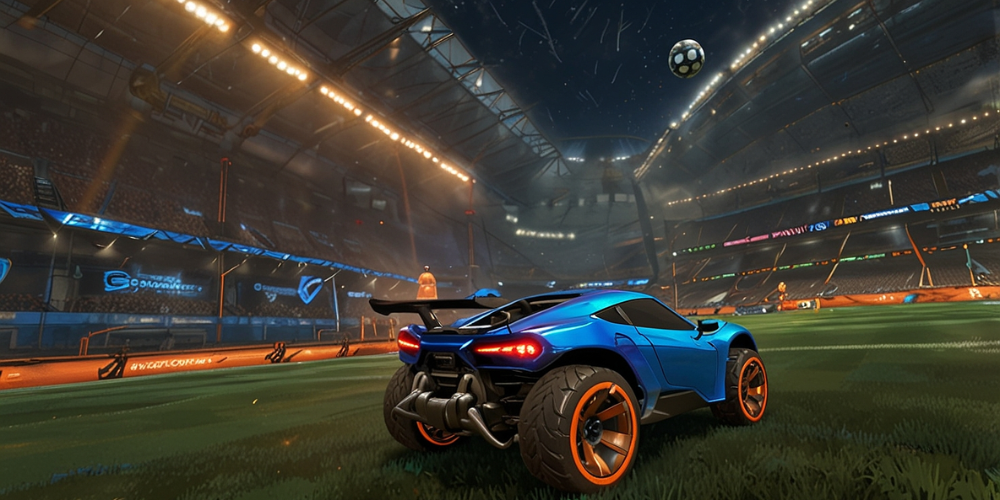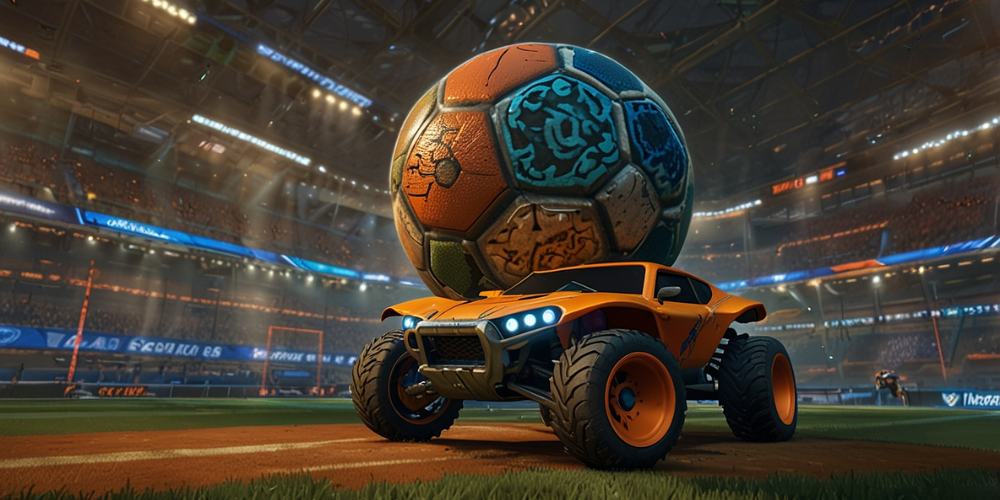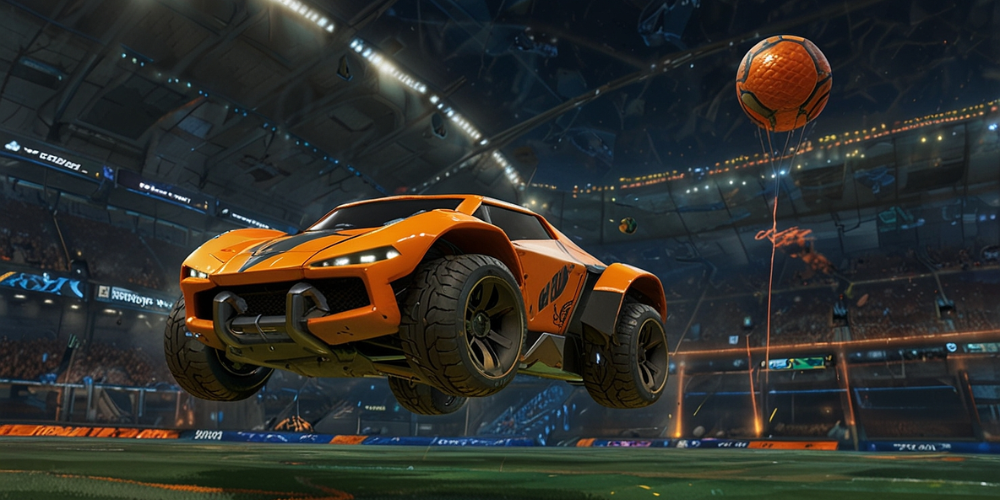Rocket League: Merging Sports and Driving for a Fast-Paced, Skill-Based Experience
- Oct 13, 2024
- 741

Rocket League is a game that took two seemingly unrelated genres—sports and driving—and merged them into a thrilling, fast-paced experience that quickly became a phenomenon. When I first jumped into a match, I was amazed at how Rocket League managed to blend the excitement of soccer with the precision of a driving game, creating something entirely new. The game’s unique combination of skill, speed, and teamwork made every match feel intense and unpredictable. For me, Rocket League is a perfect example of how creative game design can take familiar mechanics and transform them into something fresh and exciting.
Simple Yet Addictive Gameplay
One of the reasons Rocket League is so successful is its simplicity. The core concept is easy to grasp—drive a car, hit a giant ball, and score goals. But beneath this simple premise is a deep and nuanced gameplay experience that rewards skill and practice. The game’s controls are intuitive, but mastering the aerials, dribbles, and complex maneuvers takes time and dedication. For me, Rocket League’s addictive gameplay comes from this balance between accessibility and depth, as each match offers endless opportunities to improve and try new strategies.
Teamwork and Strategy
Rocket League is a team-based game, and success depends on effective communication and cooperation with teammates. Whether playing in 2v2, 3v3, or 4v4 modes, teamwork is essential for coordinating attacks, defending the goal, and setting up plays. The game’s fast pace means that strategy can change in an instant, requiring players to adapt and react quickly to the movements of the ball and the positions of their teammates. For me, the emphasis on teamwork made every match feel dynamic and exciting, as each player contributed to the overall strategy of the team.
Mastering the Aerial Game
One of the most impressive and challenging aspects of Rocket League is its aerial gameplay. Unlike traditional soccer, Rocket League allows players to launch their cars into the air to hit the ball, leading to spectacular goals and saves. Mastering the aerial mechanics requires precise timing, control, and practice, as players must learn to boost, flip, and rotate in mid-air to strike the ball accurately. For me, the aerial game added a whole new layer of complexity to Rocket League, making the gameplay feel more skill-based and rewarding as I improved my abilities over time.

Customizable Cars and Personalization
In Rocket League, I have the opportunity to customize my car extensively, selecting from various decals, wheels, boost trails, and other personalization options. While these customizations don’t affect gameplay, they add a fun element of personalization, letting me express my style and stand out on the field. The ability to unlock new cosmetic items through gameplay or special events gave me an extra incentive to keep playing and experimenting with different looks. For me, the customization options in Rocket League added a layer of fun and creativity, allowing me to make my car feel truly unique.
Competitive and Casual Modes
Rocket League provides both competitive and casual modes, accommodating players of all skill levels. In competitive mode, I could test my skills against other players in ranked matches, where every game felt like a high-stakes challenge. In casual mode, I could relax and enjoy the game without the pressure of rankings, allowing for a more laid-back experience. The variety of modes meant that I could play Rocket League however I wanted, whether I was looking for serious competition or just a fun, casual match. For me, the flexibility of these modes made Rocket League a game that I could enjoy in any mood.
The Thrill of E-Sports
Rocket League has become a major player in the e-sports scene, with professional teams and tournaments showcasing the highest level of play. Watching skilled players perform incredible aerial goals, perfect saves, and intricate team strategies is a testament to the depth of the game’s mechanics. For me, the e-sports aspect of Rocket League added an extra layer of excitement, as I could watch the best players in the world and learn from their techniques, while also appreciating the high level of skill required to compete at the top.
Physics-Based Gameplay
Rocket League’s gameplay is heavily influenced by its physics engine, which makes every interaction with the ball feel realistic and dynamic. The ball’s movement is affected by factors like momentum, speed, and angle, creating a level of unpredictability that keeps each match fresh. Learning how to manipulate the ball’s physics to perform powerful shots or delicate passes was a key part of mastering the game. For me, the physics-based gameplay made Rocket League stand out from other sports games, as it added a level of realism and complexity that kept the action engaging and exciting.

Cross-Platform Play and Accessibility
One of Rocket League’s standout features is its support for cross-platform play, allowing players on different consoles and PCs to compete against each other. This feature broadened the game’s player base and ensured that matches were always full of skilled opponents, no matter what platform I was playing on. The accessibility of Rocket League, with its simple controls and intuitive mechanics, made it easy for new players to jump in and have fun, while the depth of the game kept experienced players coming back for more. For me, cross-platform play made Rocket League feel like a truly inclusive experience, where players from all backgrounds could come together and compete.
Ongoing Support and Updates
Since its release, Rocket League has received regular updates and new content, including new arenas, game modes, and seasonal events. This ongoing support has kept the game feeling fresh and exciting, as there’s always something new to explore or unlock. The developers' dedication to enhancing the game and responding to player feedback has allowed Rocket League to retain its popularity throughout the years. For me, the consistent updates and support have made Rocket League a game that I keep coming back to, knowing that there will always be something new to experience.
Game Modes Beyond Soccer
While Rocket League’s core gameplay is based on soccer, the game also features a variety of alternate modes that offer unique twists on the formula. Modes like Hoops (basketball), Snow Day (hockey), and Rumble (with power-ups) add variety and fun to the experience, keeping the gameplay fresh and unpredictable. These alternate modes allowed me to experiment with different strategies and mechanics, adding a new dimension to the game. For me, the inclusion of these additional modes made Rocket League even more enjoyable, as they provided a break from traditional matches and offered new challenges.
The Legacy of Rocket League
Rocket League has left an indelible mark on both the sports and driving game genres, creating a new hybrid experience that has captivated millions of players worldwide.The combination of high-speed action, skill-centric gameplay, and team collaboration has cemented its status as one of the most beloved and lasting games of its era. For me, Rocket League’s legacy lies in its ability to merge two genres in a way that feels fresh, exciting, and endlessly fun. Its impact on gaming is undeniable, and its continued popularity in both casual play and e-sports shows that Rocket League is here to stay.